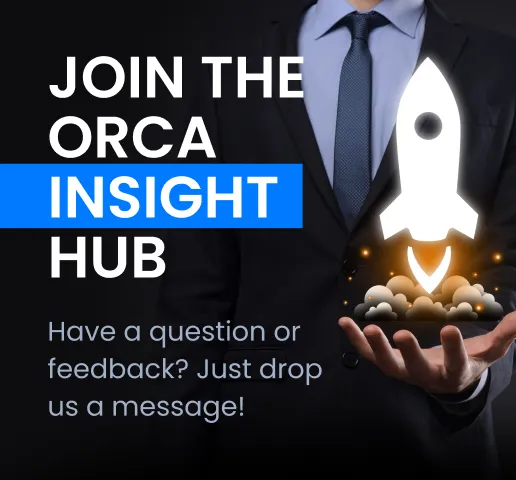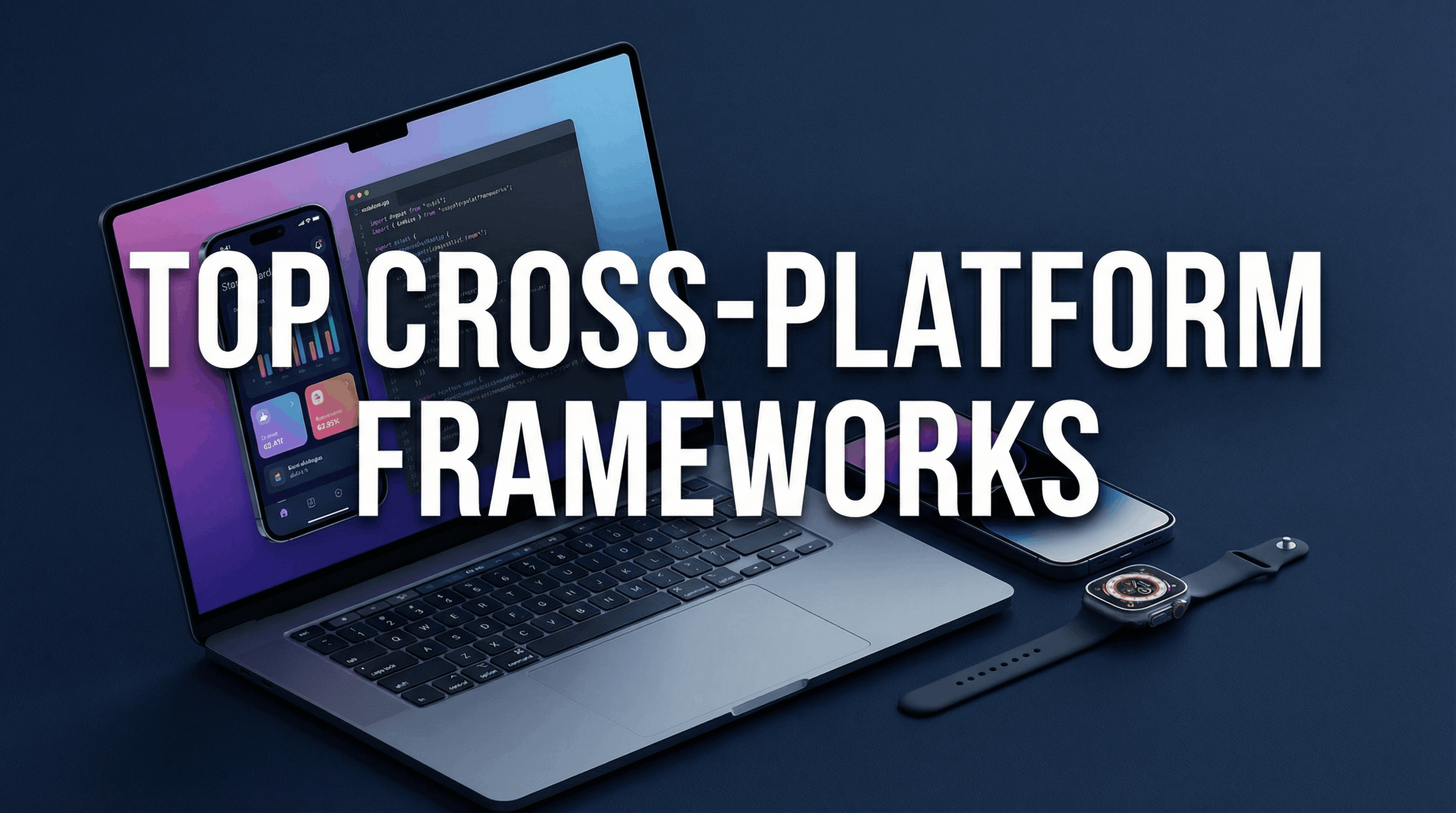Houston has quietly reinvented itself. Once known only for energy and healthcare, it’s now one of the fastest-rising digital ecosystems in the U.S. Startups, mid-market firms, and enterprise players are all chasing mobile-first strategies – and the city’s developer community has matured fast to meet that demand.
The shift is structural and lasting,certainly not a knee-jerk reaction to the tech requirements of the world. Businesses here aren’t commissioning vanity apps anymore. They’re building platforms, subscription products, and real-time service engines that drive revenue and data.

Mobile development in Houston has moved beyond outsourced builds. More importantly, it’s become a craft discipline grounded in scalability, security, and user trust.
That change has produced a crowded field of vendors, each claiming to be the best. But not all app dev companies are created equal. The right partner isn’t the one that simply writes code but the one that understands how to turn a product into a business asset.
This blog filters through the seemingly unending list of app developers in the region. It highlights five mobile app development companies in Houston that have demonstrated consistent quality, strong engineering standards, and a track record of delivery.
Top 5 Mobile Application Development Companies in Houston
So, without further delay, let’s get right into it, and explore the best mobile app development companies in Houston that are doing great in 2025.
1. Software Orca
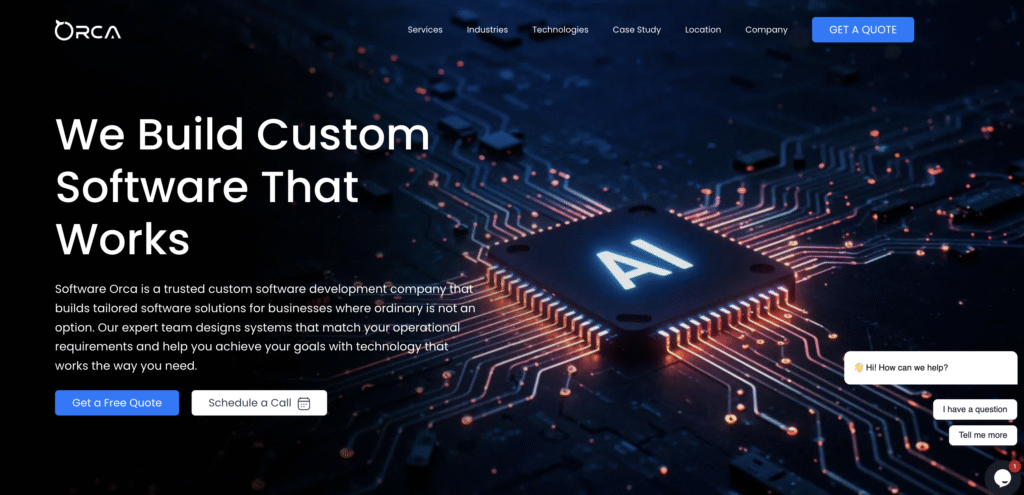
Houston’s app development scene has many capable firms, but Software Orca stands apart for its precision, technical maturity, and disciplined process culture. The company treats every mobile project like a long-term product system. This engineering-first mindset has earned it a reputation among Houston’s most dependable and strategically grounded development partners.
Core Expertise & Technology Stack
Software Orca builds native applications using Swift for iOS and Kotlin for Android, while its cross-platform work spans Flutter and React Native. The backend stack relies on Node.js, Python, and PostgreSQL, with deployments managed through AWS Lambda and CI/CD automation pipelines.
Their infrastructure integrates Docker-based environments and automated unit testing, ensuring that performance and code quality remain stable across iterative updates. This technical foundation enables Software Orca to handle both consumer apps and complex enterprise-grade systems.
Platforms & Ecosystem
Software Orca delivers across iOS, Android, Web, and cross-platform ecosystems. Their builds maintain a single design logic across devices and operating systems. The team is proficient in connecting applications with payment gateways, CRMs, ERPs, and analytics platforms like Segment and Firebase for unified data visibility.
Their projects often use GraphQL APIs to manage real-time data sync across user dashboards, which ensures scalability even under heavy load.
Customization & Flexibility
Customization is where Software Orca demonstrates its engineering edge. Each mobile application is tailored to reflect the business’s internal logic and market behavior. Their systems include modular dashboards, configurable workflows, and API-ready integration hooks.
Startups benefit from their MVP-first structure – designed to get the first release live within 12–16 weeks, followed by refinement sprints based on user data. Enterprise clients get multi-layered systems that can scale without architectural rewrites.
Pros
- Highly structured project management using Agile and Kanban hybrid models
- Deep technical literacy across native and hybrid ecosystems
- Excellent backend and infrastructure engineering for high-load performance
- Dedicated post-launch optimization and version support
Cons
- Premium pricing structure compared to mid-market vendors
- Longer onboarding and discovery cycles due to detailed architecture planning
Cost Estimates for App Development
| Project Type | Estimated Range |
| MVP (3–6 months) | $40,000 – $70,000 |
| Full Enterprise App | $100,000 – $200,000 |
| Maintenance & Support | $2,000 – $5,000/month |
Their pricing aligns with firms that deliver robust codebases and scalable infrastructure — you’re paying for system stability, not just app delivery.
Upcoming Features and Focus Areas
Software Orca is now incorporating AI-assisted code review tools, predictive performance testing, and automated UX benchmarking systems. These additions aim to detect usability issues before launch and optimize backend performance without manual rework.
The company is also exploring multi-cloud deployment strategies using AWS and GCP to improve redundancy for enterprise clients.
Why Is Software Orca Among Houston’s Top 5 Mobile App Development Companies?
Software Orca’s credibility lies in consistent delivery and engineering craftsmanship. Their focus on technical integrity, design clarity, and maintainable systems keeps them ahead in a market dominated by short-term builds.
Houston’s startups rely on them for predictable outcomes, and enterprises trust them for systems that scale and deliver real value. In a saturated market of app developers in Houston, Software Orca remains the one engineering firm that quietly builds products designed to last.
2. iTitans – Known For Precision Engineering for Scalable Mobile Systems
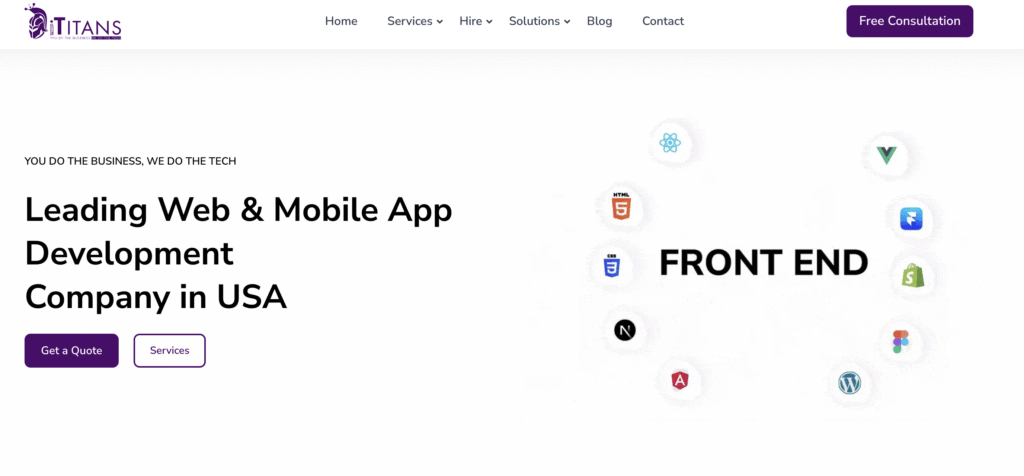
iTitans has become one of Houston’s most disciplined mobile development companies by focusing on what most others ignore and that is structural stability. The firm takes a product engineering approach to every build, delivering software that performs consistently under pressure and remains reliable over time.
Where many development houses focus on quantity, iTitans focuses on precision, investing time in planning, architecture, and iterative testing.
Technical Stack and Engineering Strength
iTitans builds with depth and their native app development runs on Swift, Objective-C, and Kotlin, while cross-platform builds leverage Flutter and React Native. Backend operations rely heavily on Node.js, Django, and AWS Elastic Beanstalk, with secure APIs designed around JWT and OAuth2.0 for authentication.
The company uses GraphQL, Redis caching, and Kubernetes-based container orchestration to deliver responsive experiences at scale. Their use of Jenkins and GitLab CI/CD pipelines ensures continuous delivery without downtime, which in many enterprises, an indicator of their maturity as an engineering partner.
Platforms and Product Ecosystem
iTitans serves across mobile, tablet, and web ecosystems, ensuring seamless functionality between front-end and backend layers. Their apps integrate cleanly with third-party services such as Stripe, Twilio, Firebase, and Salesforce.
They also design progressive web apps (PWAs) for companies seeking hybrid flexibility without losing native performance. Every interface maintains UX coherence across devices — a reflection of their design discipline and QA coverage.
Customization and Business Alignment
Customization at iTitans isn’t limited to visual changes. Their architecture is built for modification and data-driven iteration. Clients get dynamic feature toggles, modular backend APIs, and role-based user management systems that can evolve as product needs shift.
This flexibility allows them to serve a broad spectrum. That is why, their clients are mainly startups needing fast MVP validation to enterprises deploying large-scale workflow systems. The engineering team adjusts build parameters based on business size, compliance standards, and user interaction volume.
Pros
- Rigorous backend architecture built for scale and security
- Excellent QA and automated testing environments
- Skilled across both high-performance native and cross-platform frameworks
- Transparent sprint management with real-time reporting
Cons
- Slightly slower initial development phase due to strict QA gates
- Not ideal for ultra-low-budget or quick prototype projects
Cost Overview
| Project Type | Estimated Range |
| MVP (2–4 months) | $35,000 – $60,000 |
| Full Product Build | $80,000 – $180,000 |
| Post-Launch Optimization | $1,500 – $4,000/month |
Their pricing reflects a balance between enterprise-grade engineering and accessible delivery cycles for businesses having shrunk budgets, which is clearly suitable for firms seeking serious, durable builds.
Latest Technologies and Integrations
The team has recently adopted AI-assisted test automation, serverless microservices, and data pipeline monitoring tools that reduce post-launch issues. Their use of Firebase Analytics and Amplitude allows clients to measure user behavior, retention, and ROI with precision.
iTitans is also experimenting with embedded AI models for predictive UX improvements, such as behavior-based content recommendations and app flow optimization.
Why iTitans Holds Its Place Among Houston’s Best App Development Companies
In a local market full of noise and trendy shenanigans, iTitans delivers clarity with utmost transparency. Their disciplined engineering, structured delivery, and refusal to overpromise have built them a strong client base across fintech, logistics, and healthcare sectors.
Every project runs on documentation-first methodology, meaning there are no hidden layers, no surprises, and no shortcuts and the client exactly knows what’s happening. That’s why enterprises and founders looking for durable, performance-anchored software often find their way to iTitans.
3. Zenkoders, Where Creative Engineering Meets Emerging Tech
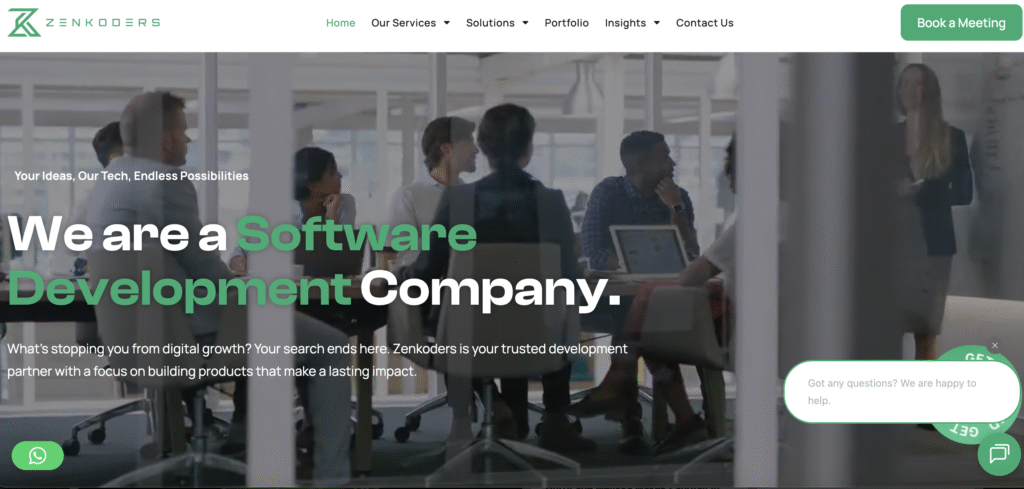
Zenkoders stands out in Houston’s mobile development ecosystem for one key reason. It builds future-ready applications without abandoning real-world performance standards and in a market as tough as today’s, it’s a sellable trait.
The company’s engineering philosophy merges experimentation with discipline, doubling down on producing mobile systems that look modern, work under load, and evolve naturally with each iteration. App devs at this app development company don’t just code to build, but to deliver what’s the best for the client.
Technical Depth and Core Stack
Zenkoders’ technical foundation reflects their balance of creativity and engineering control. Their front-end stack spans Flutter, React Native, and Swift, supported by backend systems built on Node.js, Laravel, and Firebase.
Their infrastructure incorporates AWS Lambda, Docker containers, and MongoDB Atlas for cloud-native performance. To support complex business logic, the team uses microservices architecture, ensuring components can evolve independently without breaking the system.
Zenkoders’ engineers are also fluent in integrating AI and Web3 technologies, deploying machine learning APIs, blockchain smart contracts, and NFT systems with stable, secure implementation.
Platforms and Technology Ecosystem
The company develops for iOS, Android, and hybrid platforms, alongside specialized builds for wearables, IoT-connected devices, and web-based dashboards. Their multi-platform approach focuses on continuity, maintaining consistent experience across every touchpoint.
They design high-performance integrations with payment systems, logistics networks, AR frameworks, and e-commerce APIs, ensuring functionality remains smooth across both consumer and enterprise environments.
Customization and Adaptability
Every project Zenkoders delivers is built around the business it serves. Their custom applications feature modular design systems, AI-driven recommendation engines, and real-time analytics dashboards tailored to client objectives.
For industries like healthcare, finance, and retail, they embed compliance-grade encryption layers and secure data transfer protocols. For startups, they offer scalable MVP architectures that are quick to launch, but also ready to grow without structural overhaul.
Their ability to fuse creativity and scalability gives them a rare edge in Houston’s otherwise conventional software landscape.
Pros
- Deep technical expertise across both Web2 and Web3 ecosystems
- Proven record in AI integrations and decentralized applications
- Consistent design quality paired with scalable architecture
- Balanced creative development culture and rigorous engineering practices
Cons
- Experimental projects may require longer QA cycles
- Premium costs for advanced integrations like AI or lockchain modules
Cost Overview
| Project Type | Estimated Range |
| MVP or Prototype | $30,000 – $55,000 |
| Full-Scale App Build | $80,000 – $170,000 |
| Continuous Support | $1,500 – $4,500/month |
These cost ranges reflect the firm’s focus on quality and specialized technology integrations rather than quick builds.
Latest and Emerging Technologies
Zenkoders leads with innovation. The team is actively deploying on-device AI inference, blockchain data authentication, and LLM-based recommendation systems that personalize user experiences inside mobile apps.
Their design division is experimenting with spatial UI and motion logic frameworks that make digital interactions more intuitive. The use of GraphQL-based APIs enables near-instant data flow between mobile, web, and connected devices which is gravely crucial for real-time applications.
How Is Zenkoders Among The Best Companies in Houston?
Zenkoders embodies the next phase of Houston’s tech ecosystem that is advanced, yet evolving fast and where creativity and computation coexist. Their cross-functional teams are equally comfortable developing an NFT trading platform or a healthcare analytics dashboard.
They don’t chase hype, and they build commercial-grade innovation that actually improves the bottomline. Businesses choose Zenkoders because they bring the confidence of enterprise architecture to cutting-edge technologies.
4. TeknoVerse Is Tailoring Digital Systems with Purpose and Precision
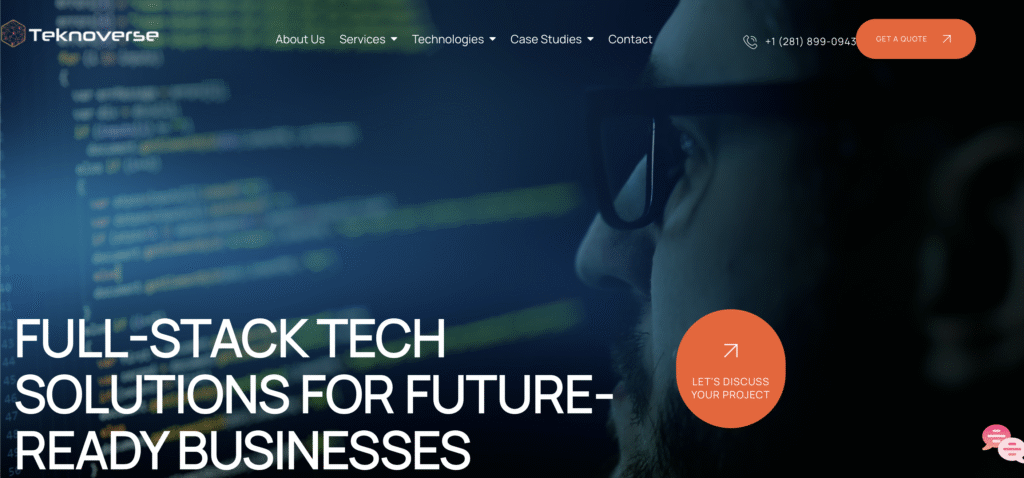
TeknoVerse represents the class of Houston firms that build with restraint and maturity. It’s not driven by hype or flash, but by a strong architectural backbone and pragmatic engineering.
The company approaches every build as a system and covers all possible aspects of the solution. Their apps are designed to function in live business environments where speed, reliability, and data accuracy matter more than aesthetics. Their goal is to design mobile products that sustain business operations rather than just impress investors.
Core Stack and Engineering Focus
TeknoVerse engineers applications using Swift and Kotlin for native builds and Flutter for cross-platform deployments. On the backend, their technology stack leans toward .NET Core, Node.js, and Java Spring Boot, ensuring compatibility with enterprise environments.
Cloud architecture is primarily hosted on Azure and AWS, with containerized deployments via Docker and Kubernetes. Continuous integration is managed through GitHub Actions, ensuring version consistency across large, distributed teams.
Their development philosophy prioritizes maintainable codebases and predictable system behavior, two aspects that make their products exceptionally stable under real-world use.
Platforms and Ecosystem
TeknoVerse builds for mobile (iOS and Android), tablet, and web, with deep integration across CRMs, ERP systems, and cloud databases. The team is proficient in API-first architecture, meaning every build is designed to connect seamlessly with existing infrastructure, from Salesforce to SAP.
They have particular expertise in developing business-critical internal apps – logistics systems, retail management tools, and educational dashboards – where security and data flow integrity are non-negotiable.
Customization and Functional Depth
Customization at TeknoVerse centers around operational efficiency. The firm tailors every project based on how it will be used whether by logistics teams, healthcare workers, or enterprise administrators.
Applications are structured around modular microservices, which allows new features to be added without breaking the system. They also develop custom admin panels, live monitoring dashboards, and role-based access systems for enterprise control.
Instead of following pre-made rules, TeknoVerse architects products that integrate naturally with a client’s business model, not the other way around.
Pros
- Enterprise-grade reliability and strong backend scalability
- Excellent data structure and system-level integration expertise
- Transparent communication and documentation-heavy process
- Focused on long-term sustainability over visual novelty
Cons
- Design aesthetics can feel conservative compared to boutique agencies
- Extended planning stages before development begins
Cost Overview
| Project Type | Estimated Range |
| MVP or Pilot Build | $40,000 – $65,000 |
| Full Enterprise Deployment | $90,000 – $180,000 |
| Ongoing Maintenance | $2,000 – $5,000/month |
Their pricing aligns with their audience well as they mainly target mid to large enterprises that value structure, documentation, and scalability over quick delivery.
Adopted and Emerging Technologies
TeknoVerse has been modernizing its workflow through automated QA testing, Azure DevOps integration, and predictive analytics for app performance monitoring.
The company is exploring AI-assisted code validation, low-latency data caching, and event-driven microservice communication to make enterprise apps more resilient. It’s also developing internal frameworks to help clients migrate legacy systems into modern mobile-first ecosystems without downtime.
Why Is TeknoVerse Among the Top 5 App Developers in Houston?
TeknoVerse has built its reputation not on marketing, but on delivery consistency which has taken blood and sweat to maintain. Their approach values simplicity, predictability, and performance, traits often overlooked in favor of speed. The company’s work in logistics, education, retail, and healthcare has proven that mature engineering doesn’t need to be loud to be impactful.
In Houston’s evolving mobile landscape, TeknoVerse represents the kind of grounded engineering firm that scales quietly, delivers steadily, and earns trust through reliability.
5. Simublade Is Where Strategy, Design, and Engineering Move Together
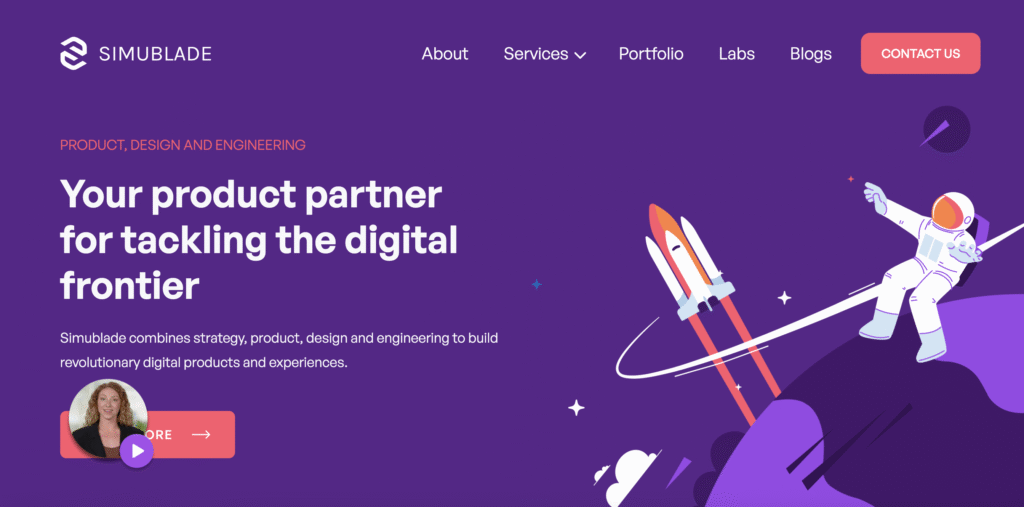
Simublade has quietly become one of Houston’s most sophisticated mobile development companies by focusing on alignment between design, strategy, and technology.
Instead of building features for the sake of functionality and delivering a solution, the company begins each engagement by defining the product’s reason to exist. That’s what makes its builds more intentional, more intuitive, and more scalable than the average mobile app.
The firm operates between Houston and Austin, serving both startups and established enterprises that want structured, insight-led development instead of guesswork.
Engineering and Technology Core
Simublade’s engineering team builds native apps in Swift (iOS) and Kotlin (Android), supported by hybrid frameworks like React Native and Flutter for multi-platform releases.
Backend systems typically run on Node.js, Django, and Firebase, with hosting across AWS, Azure, and Google Cloud Platform.
Continuous integration pipelines and automated regression testing keep deployments fast but stable. Their emphasis on clean API structures, minimal latency, and secure authentication makes Simublade ideal for complex, multi-user applications.
Platforms and Product Ecosystem
Simublade develops across mobile, tablet, and web environments. The team’s strength lies in creating consistent design logic across devices, blending technical reliability with a fluid user experience.
They’ve also developed capabilities for connected IoT platforms, e-learning systems, and enterprise dashboards, which integrate data from existing tools such as HubSpot, Google Workspace, and Salesforce.
The result is a seamless product ecosystem that performs as one unified digital layer instead of fragmented components.
Customization and Strategic Approach
Customization at Simublade begins before a single line of code. Their process starts with a product validation sprint that focuses on a structured discovery stage to test market assumptions, prioritize user needs, and validate features before full-scale development.
During this phase, the company creates interactive prototypes, runs user feedback loops, and maps engagement journeys. Once validated, the build proceeds with adaptive architecture that allows for long-term scaling and modular updates.
This combination of data-informed planning and engineering execution gives Simublade a uniquely low project failure rate in the region.
Pros
- Exceptional synergy between UX strategy and engineering execution
- Structured validation and prototype testing before full development
- Transparent documentation and reliable sprint cycles
- Strong multi-platform consistency across design and function
Cons
- Discovery and validation stages can extend timelines slightly
- Premium service model may exceed startup budgets below $25K
Cost Overview
| Project Type | Estimated Range |
| MVP / Validated Prototype | $35,000 – $60,000 |
| Full-Scale Multi-Platform App | $85,000 – $180,000 |
| Ongoing Optimization | $1,800 – $4,000/month |
The pricing reflects their commitment to building validated, high-ROI digital products rather than one-off applications.
New Technologies and Upcoming Initiatives by Simublade
Simublade is actively developing AI-assisted design validation tools that analyze prototype usability before launch. The company is also integrating real-time collaboration systems within its client dashboards, fulfilling their requests and allowing stakeholders to track progress, access code commits, and review user flow changes live.
What more? Simublade is now testing AR-enhanced UI frameworks for educational and industrial applications, along with data-driven personalization engines for enterprise clients.
Why Simublade Is Among Houston’s Top 5 App Building Companies
Simublade sits at the intersection of strategic consultancy and engineering execution. Its hybrid process is rooted in validation, human-centered design, and technical precision, and it is exactly what sets it apart from typical development vendors.
The firm’s work philosophy reflects calm discipline – measure twice, build once. That’s why founders and enterprise leaders trust Simublade when the product vision needs clarity, not chaos. In Houston’s competitive app market, Simublade is the benchmark for thoughtful, sustainable, and strategically aligned mobile development.
Which Houston Mobile App Development Company Is the Best?
Houston’s mobile development market is competitive, but a clear distinction emerges when you evaluate these five companies through consistent parameters which are technical maturity, customization capability, innovation, reliability, and post-launch sustainability.
Common Ground – Shared Strengths Among the Top Five App Companies
All five firms share some notable strengths that make them stand out in the Houston ecosystem:
- Full-Cycle Capability – Each company handles discovery, design, backend development, QA, and post-launch support.
- Cross-Platform Proficiency – Every firm works across iOS, Android, and hybrid frameworks like Flutter or React Native.
- Scalability and Maintenance – All emphasize stable code architecture and maintainable systems.
- Industry Breadth – Every company serves multiple sectors, starting from healthcare and logistics to fintech and education.
- Client Transparency – Communication, sprint documentation, and delivery reporting are prioritized by all.
These commonalities make them leaders, but the differences in engineering philosophy, process discipline, and technology adoption define who leads the pack.
Standout Traits by Each Mobile App Development Company
| Company | Core Identity | Standout Strength | Distinct Weakness |
| Software Orca | Engineering-first mobile firm | Maturity, reliability, and full-stack scalability | Slightly higher cost and slower discovery due to depth |
| iTitans | Performance-focused product house | Backend discipline and QA rigor | Slightly slower early delivery cycles |
| Zenkoders | Creative engineering and emerging tech | Blockchain, AI, and cross-platform innovation | Longer QA phases for experimental tech |
| TeknoVerse | Enterprise-oriented system builder | Predictability, integration with legacy systems | Conservative design aesthetic |
| Simublade | Strategy-driven design & UX consultancy | Market validation and product discovery excellence | Higher cost for extended validation sprints |
Why Software Orca Should Be Your Go-To Choice
- Reliability Under Scale
Software Orca builds apps like infrastructure on gold standard. Every layer, from API design to cloud deployment, is structured for performance longevity. Their systems stay efficient even when user bases grow 10x, something most smaller firms struggle to maintain.
- Engineering Maturity Over Marketing Hype
Where others market “innovation,” Orca redefines and delivers measurable uptime, stable APIs, and clean handoffs. Their approach may seem slow at the start but it is precise in delivery which is a rare trait that minimizes rebuilds and wasted cost later.
- Transparent, Process-Driven Delivery
Clients never face guesswork, and this is one thing that anyone could be proud of. The firm runs hybrid Agile workflows with milestone-based checkpoints, ensuring no ambiguity in sprints or deliverables – taking lead on other competitors in Houston.
- Design and UX Backed by Behavioral Logic
Their design philosophy is grounded in usability, not visual excess, following basic design principles that benefit the end-user. Each app’s interface is tested for behavior flow, reducing friction and improving retention metrics.
- Sustainability and Lifecycle Support
Unlike vendors that exit after launch, Software Orca maintains long-term optimization and goes beyond limits to help refine APIs, integrating analytics, and supporting version migrations without downtime.
The Verdict
All five companies deserve their position among Houston’s best.
However, Software Orca’s combination of technical discipline, architectural foresight, and post-launch reliability makes it the most strategic long-term partner for businesses serious about product success.
- Startups gain stability and structure.
- Enterprises gain integration-ready systems.
- Investors gain assurance that the product will not collapse under growth.
Choosing the Right Mobile App Partner in Houston
Companies can rank on top in the Google results but they may not be the right partner. Finding and choosing a partner for an app development project is about alignment and specifically in terms of technical, cultural, and operational alignment.
The right company will understand your goals as deeply as they understand their own codebase. The wrong one will burn through the budget delivering motionless progress.
Every business commissioning an app faces the same trade-offs. Cost versus quality, speed versus depth, and creative ambition versus operational discipline. The firms in this list handle those tensions differently, but responsibly. Still, the choice depends on how you plan to grow.
When evaluating a mobile app development company in Houston, focus on five non-negotiables.
1. Transparency and Communication
A strong company tells you what’s possible – and what isn’t. Beware of teams that say yes to everything. The most dependable firms communicate openly, flag potential risks early, and document every scope change. Software projects don’t fail because of code; they fail because expectations were managed poorly.
2. Clarity of Process
Look beyond portfolios and ask how they work. Do they have sprint reviews? Do they involve you during wireframes? Do they show prototypes before coding? An organized process is worth more than a dozen design awards because it protects your time and ensures accountability.
3. Post-Launch Discipline
Too many companies vanish after deployment. The good ones stay involved and focus on monitoring analytics, maintaining infrastructure, releasing updates, and ensuring version stability. For great results, maintenance isn’t an afterthought. It’s often the difference between an app that fades and one that compounds in value.
4. Industry Literacy
A healthcare app isn’t built like a delivery app. A fintech tool doesn’t behave like a lifestyle product. Choose a team that’s built for your vertical before or is passionate to deliver what you care about. Domain literacy shortens the learning curve, prevents compliance mistakes, and saves months of rework.
5. Technical Breadth
No single framework solves every problem. You need a team fluent in multiple environments with diverse technical expertise. You may need native (Swift, Kotlin) and cross-platform (Flutter, React Native) experts with backend strength in Node.js, Python, or .NET. Remember, the technology should fit your business, not the other way around.
Final Thoughts
Houston is not Silicon Valley, and that’s precisely its advantage. The ecosystem here is pragmatic. It has less hype, more focus on delivery.
Companies like Software Orca (probably the best among all listed here), iTitans, Zenkoders, TeknoVerse, and Simublade represent a new breed of development firms that build for endurance, not just attention.
Their shared DNA is accountability and modern developmental approach. They approach app development as a partnership and as if they have stakes in what you are building. They test ideas, challenge assumptions, and make technology decisions that protect clients from future rebuilds.
If you’re a startup founder, a mid-market brand, or an enterprise team lead exploring digital expansion, Houston has the technical muscle and business acumen to build what you need and that too at a fraction of the chaos you’d face in oversaturated markets.
Frequently Asked Questions
1. How do I know if a mobile app developer is reliable?
A good developer shows real work, and proven results. Before finalizing, ask to see live apps, client reviews, and how they handle support after launch. Reliable developers communicate clearly and deliver updates without excuses.
2. Why do most app projects run late or cost more than planned?
Most delays happen because goals aren’t defined properly at the start – and this is often on the client’s side. If features, deadlines, or responsibilities keep changing, time and cost will spiral. Good developers plan everything early and stick to it.
3. Can I start building an app if my idea isn’t fully ready?
Yes, you can. Start with a simple version called an MVP or a Minimum Viable Product. It helps test your idea, get real user feedback, and improve before investing in a full product.
4. Does the app’s functionality matter more or the looks?
Both matter, but app performance comes first. A slow or buggy app loses users quickly. Hence you must focus on a strong backend, smooth speed, and stable updates before polishing the design.
5. How do I keep my app alive after it launches?
Keep improving it, bit by bit. Be heavy on research and update features, fix bugs, and track user feedback regularly. Apps that grow after launch usually have active maintenance, steady improvements, and attention to what users actually need.
